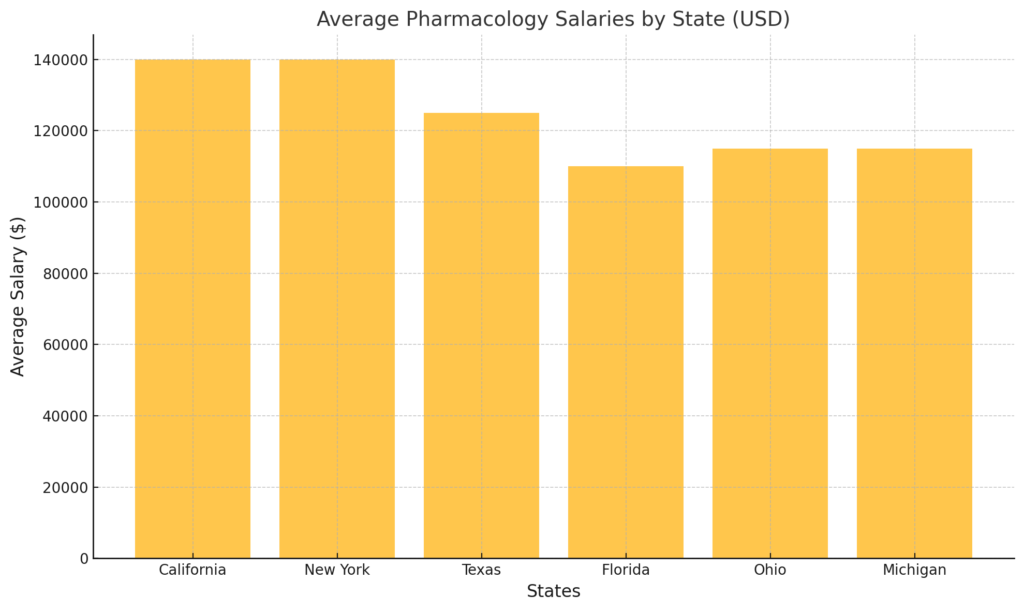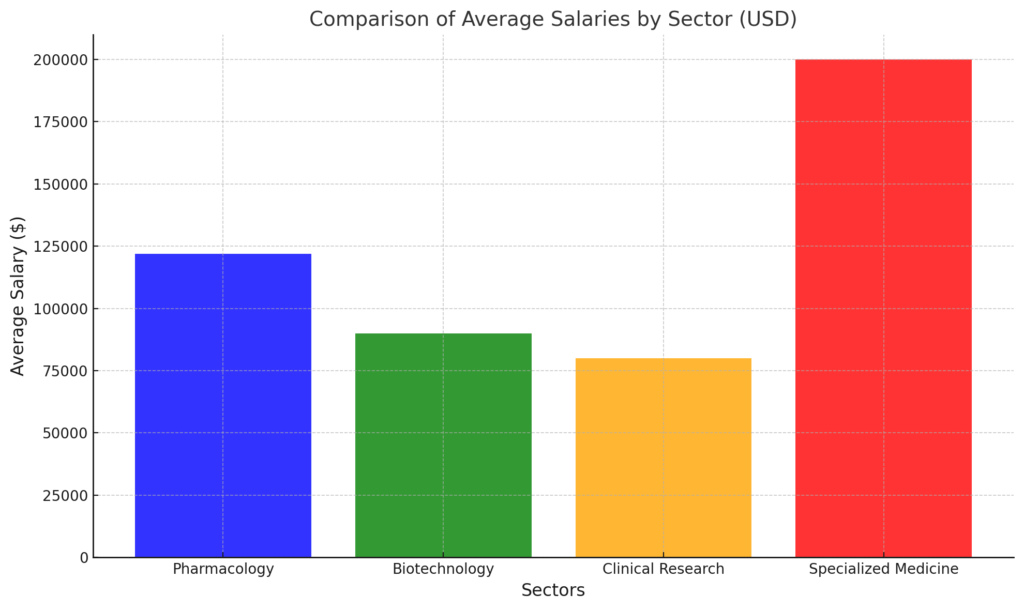Pharmacology, a branch of science focused on the study of drugs and their effects on the human body, offers lucrative career opportunities. As the demand for pharmaceutical professionals rises, understanding the earning potential in this field becomes essential. In this article, we explore pharmacology salaries in the United States, factors that influence income, and additional insights for those aspiring to enter this rewarding profession.
Average Pharmacology Salaries in the US
The average salary for pharmacologists in the United States is approximately $96,000 to $122,000 annually. However, this range can vary significantly based on factors such as experience, location, and specialization.
- Entry-level positions: Pharmacologists with less than three years of experience typically earn between $70,000 and $85,000 per year.
- Mid-level professionals: With five to ten years of experience, salaries rise to $110,000 to $130,000 annually.
- Senior roles and specialists: Professionals with over a decade of experience or those specializing in niche fields, such as toxicology or clinical pharmacology, can earn upwards of $150,000 per year.

Key Factors Influencing Pharmacology Salaries
Several factors contribute to variations in pharmacology salaries:
- Location: Pharmacologists in metropolitan areas or states like California, New York, and Massachusetts earn higher wages due to the higher cost of living and increased demand for pharmaceutical expertise.
- Industry: Professionals working in pharmaceutical manufacturing and biotech companies often have higher earning potential compared to those in academia or public health sectors.
- Education and Credentials: Advanced degrees, such as a Ph.D. in Pharmacology, and certifications can significantly boost income levels.
- Specialization: Focused expertise in fields like neuropharmacology or oncology can lead to higher salaries.
Weekly Work Hours in Pharmacology
Pharmacologists typically work 40 to 50 hours per week, depending on their role and industry. Research-oriented positions may require additional hours for conducting experiments and analyzing data. On the other hand, regulatory roles or positions in pharmaceutical companies might offer more structured schedules.
Pharmacology vs. Pharmacy: Understanding the Pay Difference
Although related, pharmacology and pharmacy are distinct fields. Pharmacologists focus on drug research and development, while pharmacists dispense medications and counsel patients. Due to the research-intensive nature of their work, pharmacologists generally earn slightly higher salaries than pharmacists, whose average income ranges from $120,000 to $130,000 annually.
Salary Trends Over the Years
The demand for pharmacologists has grown steadily, with salaries reflecting this trend. According to the Bureau of Labor Statistics, the median income for pharmacologists has increased by approximately 12% over the past decade, driven by advancements in drug development and personalized medicine.
| Year | Median Salary ($) |
|---|---|
| 2013 | 95,000 |
| 2016 | 105,000 |
| 2020 | 115,000 |
| 2023 | 122,000 |
| 2024 | 126,000 |
| 2025 | 130,000 |
Salary Variations by State
Pharmacology salaries can also vary significantly across states. For instance, California and New York offer some of the highest average salaries, often exceeding $140,000 annually, due to the strong presence of pharmaceutical industries and research facilities. On the other hand, states like Texas and Florida provide competitive salaries averaging between $110,000 and $125,000, making them attractive for professionals seeking lower living costs. The Midwest, including states such as Ohio and Michigan, offers average salaries in the range of $90,000 to $115,000, reflecting regional economic factors and industry demands.
Comparison with Other Sectors
Pharmacology salaries are generally competitive when compared to other science and healthcare-related sectors. For instance, biotechnologists earn an average of $80,000 to $100,000 annually, slightly lower than pharmacologists, while clinical research professionals typically fall within the $70,000 to $90,000 range, depending on their roles. On the higher end, medical doctors in specialized fields, such as anesthesiology or cardiology, can earn over $200,000 per year, significantly surpassing pharmacologists. However, pharmacology offers unique advantages, such as greater opportunities for research and development roles, making it an attractive option for those passionate about scientific exploration and drug development.

Opportunities for Growth
The pharmacology field offers diverse career pathways:
- Academic Roles: Teaching and research positions at universities.
- Industry Positions: Drug discovery and development in pharmaceutical companies.
- Government and Regulatory Bodies: Roles in organizations like the FDA, focusing on drug safety and approval processes.
Pharmacology is a dynamic and well-compensated field with opportunities for growth and specialization. Aspiring professionals should consider factors such as education, location, and industry trends when planning their careers. With an average salary that remains competitive and the increasing demand for innovative drug research, pharmacology remains an excellent career choice for science enthusiasts.
Frequently Asked Questions (FAQs) About Pharmacology Salaries
1. What is the average salary of a pharmacologist in the United States?
The average salary for a pharmacologist in the U.S. ranges between $96,000 and $122,000 annually, with entry-level positions starting at around $70,000 and experienced professionals earning upwards of $150,000.
2. Which states offer the highest salaries for pharmacologists?
States like California and New York provide some of the highest salaries, often exceeding $140,000 annually, due to their robust pharmaceutical industries and higher cost of living.
3. How does pharmacology compare to other healthcare fields in terms of salary?
Pharmacologists earn more than professionals in biotechnology ($80,000 to $100,000) and clinical research ($70,000 to $90,000). However, specialized medical doctors can earn significantly more, with annual salaries exceeding $200,000 in some fields.
4. What factors influence a pharmacologist’s salary?
Key factors include education level, years of experience, specialization, location, and the industry in which they work. For instance, pharmacologists in biotech firms or pharmaceutical manufacturing often earn higher salaries compared to those in academia.
5. Do pharmacologists work long hours?
Pharmacologists typically work 40 to 50 hours per week, though research roles may occasionally require extended hours, especially during critical project phases.
6. Is pursuing a Ph.D. necessary for higher earnings in pharmacology?
While a bachelor’s or master’s degree can secure entry-level roles, a Ph.D. in Pharmacology or related fields is often necessary for higher-paying research and senior-level positions.
7. Are there opportunities for salary growth in pharmacology?
Yes, pharmacologists have significant growth opportunities. As they gain experience or specialize in niche fields like neuropharmacology or oncology, their earning potential increases substantially.
8. What industries hire pharmacologists?
Pharmacologists are in demand across various industries, including pharmaceutical manufacturing, biotechnology, academia, government agencies, and clinical research organizations.
9. How has the demand for pharmacologists changed over time?
The demand for pharmacologists has steadily increased, driven by advancements in personalized medicine, drug development, and the growing focus on healthcare innovation.
10. What skills can boost a pharmacologist’s salary?
Skills such as expertise in data analysis, clinical trials, toxicology, and regulatory compliance are highly valued and can lead to higher earnings and career advancement.

